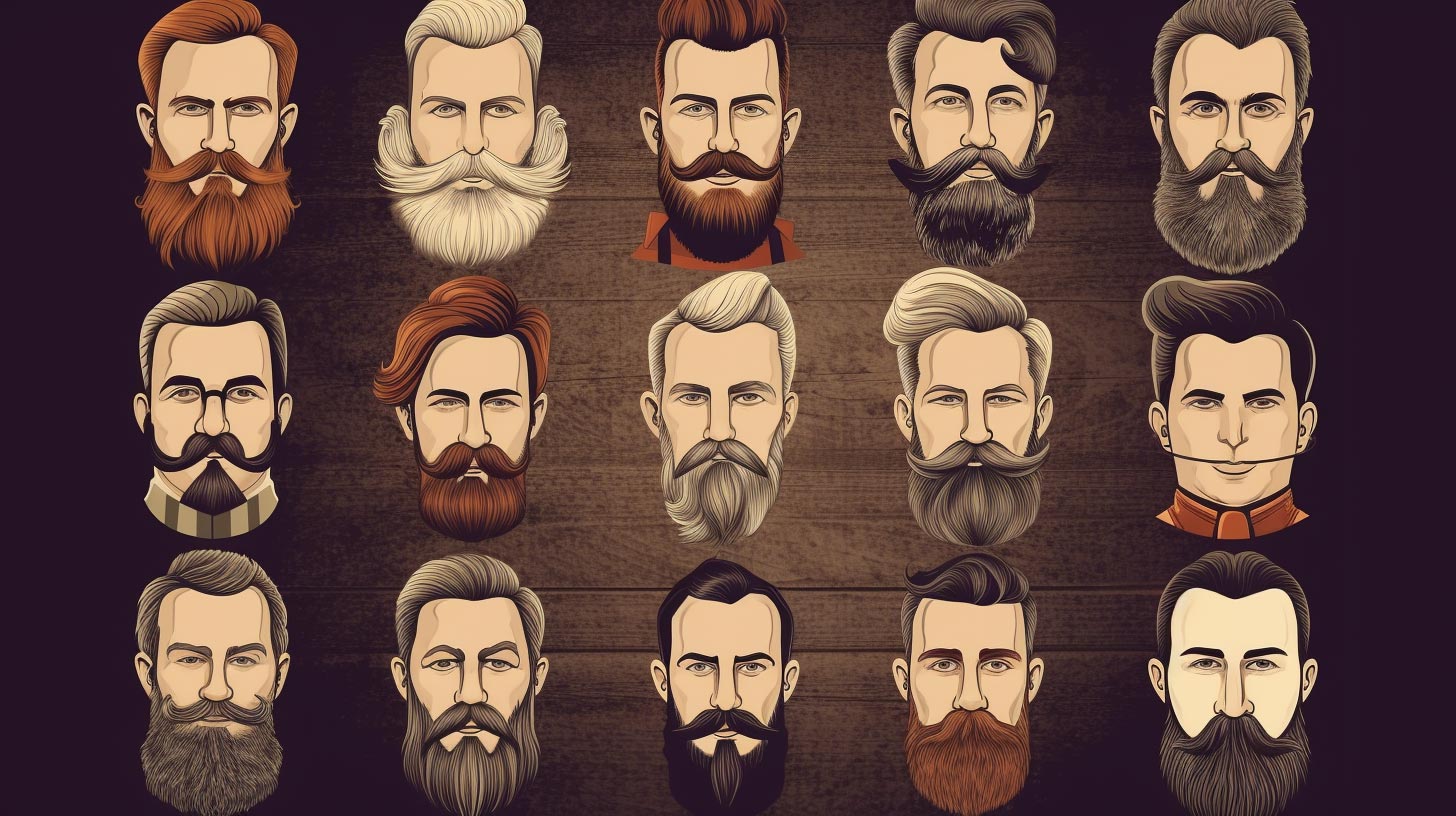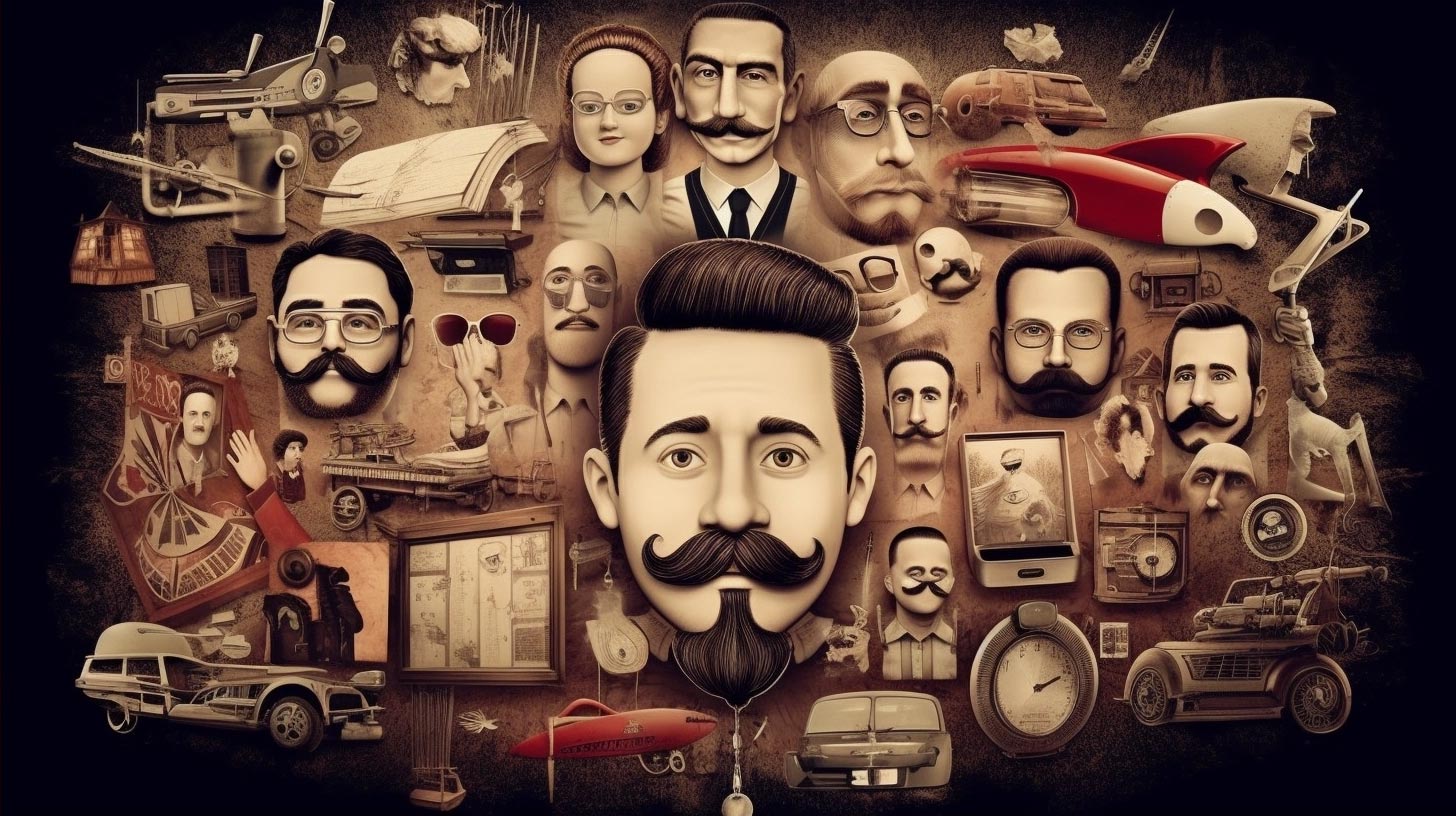From Ancient Greece to modern-day hipsters, the popularity of beards has fluctuated but never disappeared entirely.
In Ancient Greece, beards were seen as signs of virility and wisdom. However, in Ancient Egypt, facial hair was viewed as a low-class sign of animal tendencies. The Roman Empire distinguished itself from the Greeks by being clean-shaven, while in Europe, knights maintained beards as a sign of masculinity and honour.
In America, facial hair was not in vogue in the early 1900s but made a comeback when sported by hippies and the Beatles. Today, events such as the World Beard and Mustache Championship draw enthusiasts from all over the world, with some men even paying over $8,000 for facial hair transplants.
This article explores the fascinating history of beards and their various meanings throughout different cultures and time periods—so grab your favourite beard oil and let’s dive into this hairy topic!
Contents
- 1 Key Takeaways
- 2 Ancient Cultural Significance
- 3 European Attitudes
- 4 Religious Perspectives
- 5 American Trends
- 6 Modern Popularity
- 7 Frequently Asked Questions
- 7.1 What are some common beard styles throughout history?
- 7.2 Were there any cultures or time periods where beards were mandatory or forbidden?
- 7.3 How does facial hair affect job opportunities and societal perceptions in modern times?
- 7.4 Are there any health concerns associated with growing a beard?
- 7.5 What is the psychological and emotional impact of having a beard?
- 8 Conclusion
Key Takeaways
- Beards have had varying significance and meaning across different cultures and time periods.
- The modern popularity of beards can be attributed to changing attitudes towards traditional gender roles and masculinity, as well as a desire for individuality.
- Beards continue to shape our perceptions of masculinity today, and facial hair has become an important part of modern American culture.
- The World Beard and Mustache Championship draws enthusiasts from all over the world, and some men even pay for facial hair transplants.
Ancient Cultural Significance
Did you know that in ancient Greece, beards were seen as signs of virility, manhood, and wisdom? It was believed that the longer and thicker the beard, the more respected and powerful a man was. In fact, some Greeks would even swear oaths on their beards!
However, not all Greeks were fond of facial hair – the Spartans punished their soldiers by cutting off their beards.
Moving on to ancient Rome, we see a different attitude towards beards. The Romans distinguished themselves from the Greeks by being clean-shaven. They saw facial hair as barbaric and unkempt.
This trend continued in Europe for centuries with mixed support for facial hair among knights and royalty. King Henry VIII famously ordered all his courtiers to shave their beards because he didn’t want them to hide any blemishes on their faces.
But attitudes towards facial hair would change again over time…
European Attitudes
You might be surprised to learn that during the period of 330-1750 in Europe, opinions on facial hair were mixed. While some knights maintained their beards as a sign of masculinity and honour, others saw them as unkempt and unclean. King Henry VIII and Queen Elizabeth were among those who did not favour facial hair.
During the Renaissance period, there was a shift towards cleaner-shaven faces, with even women removing their eyebrows and hairlines to achieve a more youthful look. However, by the 1700s, beards began to make a comeback among artists and intellectuals who saw them as a symbol of individuality and rebellion against societal norms.
This trend would continue into the modern era where we see hipsters sporting long beards as a way to express themselves. But what about religious perspectives on facial hair?
Religious Perspectives
If you’re curious about the significance of facial hair in various religions, it’s worth noting that beards have different meanings for different faiths.
In Christianity, it wasn’t until 500 CE that Jesus was depicted with a beard. Before then, early popes and bishops opposed facial hair, associating it with barbaric tribes and pagan beliefs. However, today it’s common to see bearded priests and pastors in many denominations.
In Islam, beards are seen as an indicator of religious devotion to the Qur’an. It is believed that the Prophet Muhammad had a beard and therefore Muslim men are encouraged to grow one as well.
In Judaism, most men learn they can only trim or remove their facial hair with scissors or an electric razor due to a prohibition against using a blade on the skin.
With these perspectives in mind, let’s now explore how American attitudes towards beards have changed over time.
American Trends
Nowadays, it’s hard to deny that sporting a beard has become a popular trend among American men. From Hollywood celebrities to everyday hipsters, beards are seen as a way to express masculinity and individuality. Even professional athletes have joined the bandwagon with more players sporting beards than not.
But why has this trend taken off in recent years? One theory is that the rise of facial hair can be attributed to changing attitudes towards traditional gender roles and masculinity. In the past, being clean-shaven was seen as a sign of professionalism and sophistication while beards were associated with ruggedness and unkemptness.
However, as society becomes more accepting of diverse expressions of gender identity, men are embracing their natural facial hair rather than conforming to societal expectations. This shift in perception has made it easier for men to experiment with different styles, from full bushy beards to neatly trimmed goatees.
As we explore the modern popularity of facial hair, let’s delve deeper into its cultural significance and how it continues to shape our perceptions of masculinity today.
Modern Popularity
With Hollywood celebrities and everyday hipsters alike sporting bushy beards, it’s no wonder that facial hair has become a ubiquitous trend in modern American culture.
From the likes of Ryan Gosling to Jared Leto, it seems like every male celebrity is trying to outdo each other with their impressive facial hair.
But it’s not just limited to the rich and famous – even regular guys are growing out their beards, and some are even paying thousands of dollars for facial hair transplants.
The rise in popularity of beards can be attributed to a variety of factors. For one, it gives men a sense of masculinity and ruggedness that they may feel is lacking in today’s society.
Additionally, having a beard can make you stand out from the crowd and show off your individuality. But perhaps most importantly, growing a beard requires patience and dedication, which can give men a sense of accomplishment when they finally achieve their desired look.
So whether you’re rocking a full-on lumberjack beard or just some scruff on your chin, there’s no denying that facial hair has become an important part of modern American culture.
Frequently Asked Questions
What are some common beard styles throughout history?
Throughout history, common beard styles include the full beard, goatee, and mustache. These styles have varied in popularity and significance across different cultures and time periods. Today, there are numerous options for men looking to grow a stylish beard.
Were there any cultures or time periods where beards were mandatory or forbidden?
You may be surprised to learn that in Ancient Egypt, facial hair was seen as a sign of low class and animal tendencies. However, in some cultures like Islam, beards are considered indicators of religious devotion. There were no cultures or time periods where beards were mandatory or forbidden, but they have had varying levels of cultural significance throughout history.
How does facial hair affect job opportunities and societal perceptions in modern times?
Your facial hair can impact job opportunities and societal perceptions. Studies show that beards can make you appear more mature and competent, but may also be seen as unprofessional or unkempt in certain industries.
Are there any health concerns associated with growing a beard?
Growing a beard can lead to skin irritation, ingrown hairs, and bacterial infections if not properly cared for. Regular washing and using beard oil can help prevent these issues and keep your facial hair healthy.
What is the psychological and emotional impact of having a beard?
Having a beard can make you feel more confident and assertive, according to research. However, it can also lead to negative perceptions from others and require extra maintenance for hygiene. Ultimately, the impact of a beard on your psychology and emotions is subjective.
Conclusion
Congratulations, you’ve just explored the fascinating history of beards and their significance throughout different cultures and time periods. From Ancient Greece to modern-day hipster trends, the popularity and meaning of facial hair have varied greatly.
Throughout history, beards have been associated with virility, wisdom, animal tendencies, masculinity, honour, and even rebellion. The Roman Empire stood out for being clean-shaven while knights in Europe maintained beards as a sign of respectability.
Religion has also played a role in shaping attitudes towards facial hair. In Islam, growing a beard is considered a religious obligation while in Judaism it was customary for men to shave their beards until marriage.
In recent years, we’ve seen an explosion of interest in facial hair with events like the World Beard and Mustache Championship drawing thousands of participants from around the world. Hipster culture has also revived the popularity of beards among young people who are willing to pay thousands of dollars for transplants or grooming products.
Like fashion trends that come and go, it remains to be seen if this current fascination with beards will continue or fade away like yesterday’s news.
Studying the history of beards provides insight into how cultural attitudes change over time and how they shape our perceptions about gender roles and identity. Understanding these cultural nuances helps us appreciate why some people attach so much importance to their facial hair today – it’s not just about looking good, but also feeling connected to one’s heritage and identity.
Just as every beard is unique like a snowflake falling from the sky on a winter day, so too is every individual experience with facial hair shaped by personal choices influenced by societal norms.




